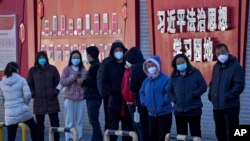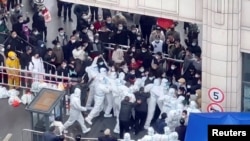China on Wednesday announced changes to its severe “zero-COVID” policy. The policy recently led to protests and calls for President Xi Jinping to resign.
For nearly three years, China tried to stop the spread of coronavirus by locking down huge cities and barring millions of people from leaving their homes. Infected people were forced into overcrowded health centers. And individuals needed to show their personal “green code” to prove they are free of COVID-19 when entering public places, using public transportation or using many services.
The severe restrictions brought rare protests in at least eight mainland cities and Hong Kong.
On Wednesday, China’s National Health Commission announced that people with mild cases of the virus can isolate at home. And it also ended test requirements for people in public places.
The government said closures of infected areas will be narrowed to households, units or buildings instead of whole neighborhoods and cities. It said schools in communities with no outbreaks must return to in-person teaching.
Wednesday's announcement became the most viewed message on China's Weibo social media service. One Weibo user wrote, "It's time for our lives to return to normal, and for China to return to the world.”
China is the last major country still trying to stop the spread of the virus. Many other nations have re-opened and learned to live with COVID. The move fueled hopes that China was dropping its zero-COVID policy which has hurt manufacturing and trade activities worldwide.
Zhiwei Zhang is the chief economist at Pinpoint Asset Management. Zhang told Reuters reporters, “This change of policy is a big step forward.” He added that he expected “China will fully reopen its borders no later than mid-2023.”
Lifting severe restrictions
China has said the country of 1.4 billion people only has 5,235 COVID-related deaths so far. The severe restrictions have helped to keep the number of reported infections low. But they have permitted few people to develop natural immunity to the virus.
In lifting many restrictions, Chinese health officials have also begun to describe the virus as less threatening.
Wu Zunyou is chief epidemiologist of the China Centers for Disease Control. He wrote on a social media service that people with mild cases “can recover by themselves without special medical care.”
The latest changes are “small steps” in a process aimed at ending restrictions, said Liang Wannian, a member of the experts group advising the National Health Commission. Liang said the government’s goal is “to return to the state before the epidemic.”
The health commission also said in a statement that local officials must take “measures to protect people’s life, safety and health” but at the same time reduce “the impact of the epidemic on economic and social development.”
Last week, the government announced a campaign to vaccinate older citizens. Health experts say that must be done before China can end restrictions on visitors coming from other countries. And the government also needs to build up the country’s hospital system to deal with a possible rise in cases.
Feng Zijian is a former official in China's Center for Disease Control. Feng told the China Youth Daily that up to 60 percent of China's population could be infected in the first wave.
He added, "Ultimately, around 80 percent – 90 percent of people will be infected."
I’m Ashley Thompson.
Hai Do adapted this report for VOA Learning English from Associated Press and Reuters sources.
_______________________________________________________________
Words in This Story
lock down –v. (phrasal) to cause people to remain in a place because of an emergency
code –v. a set of letter, numbers or symbols that identify or give information about something
mild –adj. not strong, gentle
epidemiologist –n. a scientist who studies how infectious diseases spread or can be controlled
epidemic –n. a situation in which a disease spreads quickly among a large number of people
impact –n. the resulting influence of an event
________________________________________________________________
We want to hear from you.
We have a new comment system. Here is how it works:
- Write your comment in the box.
- Under the box, you can see four images for social media accounts. They are for Disqus, Facebook, Twitter and Google.
- Click on one image and a box appears. Enter the login for your social media account. Or you may create one on the Disqus system. It is the blue circle with “D” on it. It is free.
Each time you return to comment on the Learning English site, you can use your account and see your comments and replies to them. Our comment policy is here.







Forum